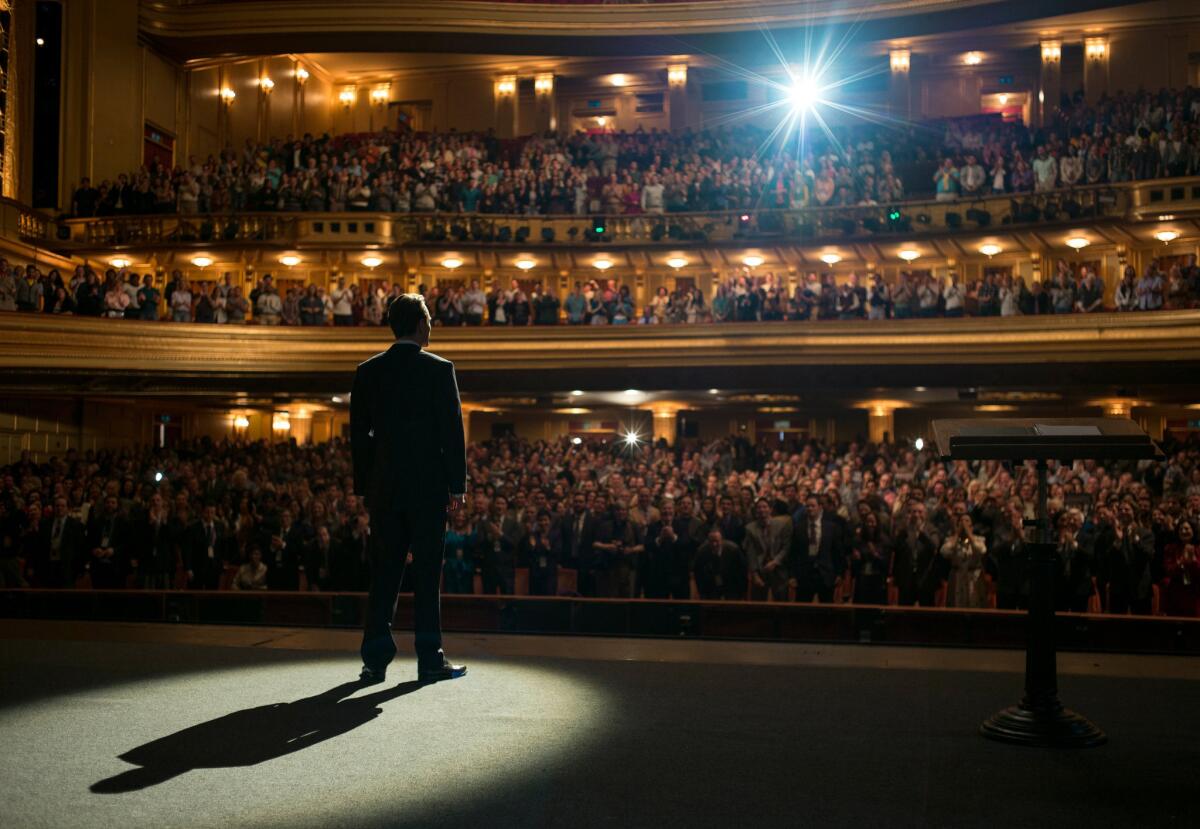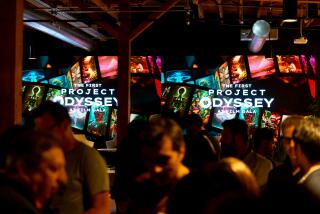‘Steve Jobs’ movie: A backstage look at a backstage drama

Michael Fassbender in a scene from “Steve Jobs” that takes place at the War Memorial Opera House in San Francisco.
In a scene midway through “Steve Jobs,” the new movie based on the life of the late Apple co-founder, the title character (Michael Fassbender) engages in a particularly heated verbal battle with estranged colleague Steve Wozniak (Seth Rogen).
Wozniak remarks that Jobs doesn’t have any real computer skills, because he isn’t an engineer or a designer. “What do you do?” he asks.
Jobs replies: “I play the orchestra.”
SIGN UP for the free Essential Arts & Culture newsletter >>
It’s no coincidence that the confrontation between the two tech heads takes place in an orchestra pit, and not just any ordinary orchestra pit. The sequence was shot on location at the War Memorial Opera House, home to the San Francisco Opera and the San Francisco Ballet.
The makers of “Steve Jobs” used three working performing arts venues in the Bay Area to tell a backstage drama that unfolds during three different product launches in 1984, 1988 and 1998.
Scenes for the latter two periods were shot at the War Memorial and the nearby Louise M. Davies Symphony Hall, home of the San Francisco Symphony.
Using real arts venues meant arranging the shoot around the schedules of the resident performing companies. In some cases, that meant filming scenes for “Steve Jobs” at odd hours, sometimes between midnight and dawn.
“Steve Jobs,” currently in theaters nationwide, was shot mostly in chronological order. In the 1984 chapter, which kicks off the movie, Jobs unveils the Macintosh personal computer during an Apple shareholders meeting.
The crew shot the sequence at the Flint Center for the Performing Arts in Cupertino. The multipurpose building, located on the De Anza College campus, was the actual venue Apple used for the event in 1984.
“Steve Jobs” filmed at the Flint in February for 11 days; the total occupancy, which includes set-up and rehearsals, was 22 days, according to Rhonda Doyle, event coordinator for the center. The scenes include shots of the actual auditorium as well as backstage, where Jobs’ personal and professional lives collide.
“The decor of Flint Center’s auditorium was not changed at all. However, our backstage area and some of the dressing rooms were slightly modified in color,” Doyle said.
For the 1988 sequence, which focuses on Job’s launch of the NeXT computer after his dramatic departure from Apple, the crew used the War Memorial, shooting from mid-February to mid-March. (In reality, Jobs’ NeXT launch took place at Davies Symphony Hall.)
“They were shooting during ballet season [at the War Memorial], and it was really complex,” said John Caldon, communications and events manager for the San Francisco War Memorial & Performing Arts Center.
He said that on some days, the San Francisco Ballet would be rehearsing on stage while the movie crew would be shooting elsewhere in the building. On other days, shooting would wait until after ballet performances concluded, usually past 10 p.m.
That meant that the crew would film from around 11 p.m. through the morning.
“It was completely unprecedented. This was the largest project that’s ever taken place here,” said Caldon, who worked with the movie production to coordinate scheduling.
He said the venue leaders agreed to let director Danny Boyle shoot there because of Jobs’ status as a local icon, and because the filmmakers “wanted the buildings to be themselves.”
For the 1998 chapter, which recounts Jobs’ return to Apple and the launch of the iMac, the crew moved to Davies Symphony Hall, where they filmed for several days in late March. For the backstage portions of the sequence, the crew created sets on a soundstage, according to Caldon.
He said they were able to work out a schedule so that the San Francisco Symphony never had to share the building simultaneously with the film crew. (In reality, the iMac launch took place at the Flint Center.)
Both the opera and ballet provided archival materials to the film to create ambiance reflecting the 1980s period, according to Jon Finck, a spokesman for the opera. They included vintage posters for the companies, with other contributions from the city’s Museum of Performance and Design.
Many scenes required a large number of extras to play Apple fans and other launch attendees. All of those extras, plus crew members, had to be fed, resulting in many catering trucks congregating in the area.
“You’d have thought this was a film about eating,” Finck said.
“Steve Jobs,” which has a screenplay by Aaron Sorkin, is one of a few recent movies to feature notable performing arts venues playing themselves.
Last year’s Academy Award-winning “Birdman” gave a starring role to Broadway’s St. James Theatre in New York, and “Black Swan” in 2010 spotlighted New York’s Lincoln Center for the Performing Arts.
Twitter: @DavidNgLAT
ALSO:
Oscar Watch: Can a box office ‘bomb’ like ‘Steve Jobs’ still contend for best picture?
I met Steve Jobs, and the movie gets its subject wrong
‘Steve Jobs’ gets as much attention for Aaron Sorkin as for Steve Jobs
More to Read
The biggest entertainment stories
Get our big stories about Hollywood, film, television, music, arts, culture and more right in your inbox as soon as they publish.
You may occasionally receive promotional content from the Los Angeles Times.











